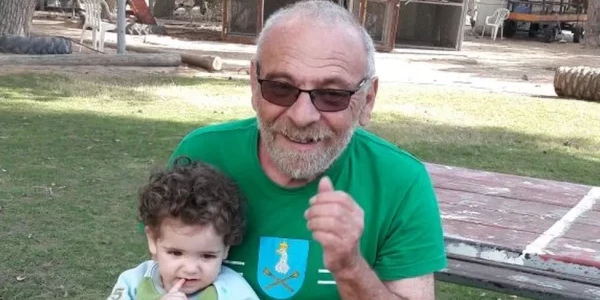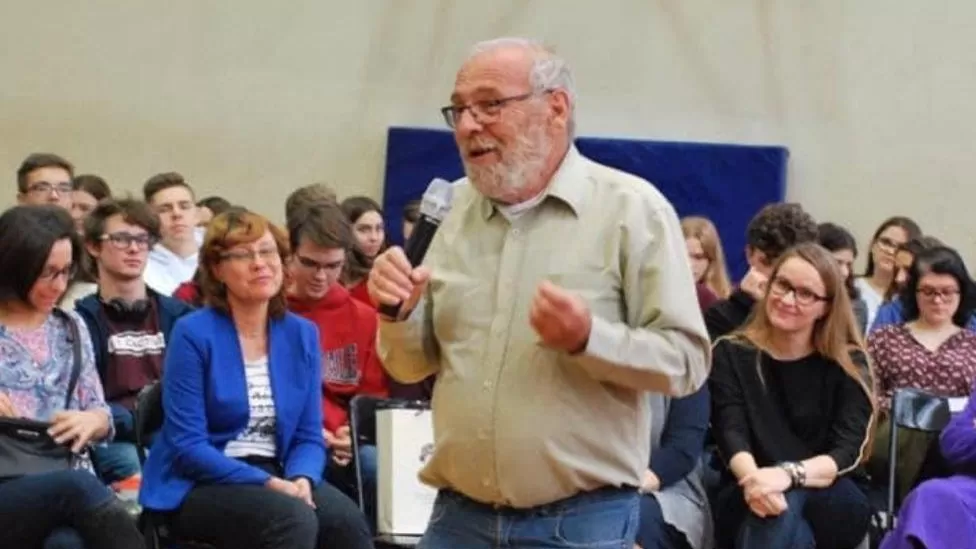Alex Danzig: Fears grow for much-loved historian kidnapped by Hamas
19/10/2023 | Na stronie od 22/10/2023

Alex Danzig with one of his granddaughters, Aviv, at the time aged two
Source: BBC News
The killing of at least 1,400 people in Israel by Palestinian Hamas militants from Gaza and the taking of more than 100 hostages have reverberated around the world, notably in central and eastern Europe, with its strong Jewish connections and memories of the Holocaust.
There, the taking of one man has caused particular distress and sorrow.
Alex Danzig, a 75-year-old scholar and historian of the Holocaust, has spent the last 30 years working for Yad Vashem, Israel's Holocaust remembrance centre, educating Jews and Poles about what happened in the later years of World War Two.
More:
- Pan Alex Danzig o Holocauście. Wyższe Seminarium Duchowne oo Franciszkanów Łódź Łagiewniki, 18 kwietnia 2023
- Alex Danzig: Opowiadam Polskę na nowo
"Tygodnik Powszechny"
Alex Danzig, organizator wyjazdów młodzieży izraelskiej do Polski: Lekcje o zagładzie są bardzo ważne, ale nie można zbudować pamięci tylko na cierpieniu. Jeśli mamy odtworzyć dialog między Polakami i Żydami, trzeba też zrozumieć prawdę o sobie – skąd jestem i kim jestem.
JACEK TARAN: Spotykał się Pan ostatnio z polską młodzieżą. Jak ją Pan odbiera? Czy rzeczywiście spoglądanie w przeszłość jest dla niej coraz mniej interesujące?
ALEX DANZIG: Często toczę dyskusje z moimi kolegami nauczycielami, którzy narzekają na młodzież. Z mojego doświadczenia wynika jednak, że to nie ona jest zła czy głupia, tylko my nie potrafimy znaleźć klucza do rozmowy z nią. Mnie pewnie i tak jest łatwiej niż nauczycielom. Przyjeżdżam jako gość z zagranicy, opowiadam ciekawe historie, więc nie muszę ich dyscyplinować. Są wtedy inni, inaczej słuchają, inaczej reagują. Ale przecież gdyby nie byli zainteresowani tymi tematami, tak by nie było. Rzadko się zdarza, żebym trafił na mur. Pytań jest zwykle bardzo dużo – najpierw jedno nieśmiałe, potem kolejne i dalej już idzie.
O co najczęściej pytają? Te pytania są bardzo różne. Oczywiście padają pytania o zagładę, o moje życie, dlaczego to wszystko się wydarzyło. Pada czasami pytanie – czy może pan przebaczyć?
I co Pan im odpowiada? To jest bardzo trudne. Pierwszy raz to pytanie padło około dziesięciu lat temu w Gorzowie. Nie spodziewałem się go. Jestem pedagogiem i próbowałem znaleźć odpowiedź, która będzie edukacyjna. Mówiłem więc, że jednej rzeczy nie mogę przebaczyć. Tego, że Niemcy pokazali nam, jak z każdego można zrobić oprawcę, i to bardzo sprytnie. Na przykład Sonderkommando w Auschwitz. Przecież to wcześniej byli fajni ludzie – Żydzi z Salonik, Żydzi z Polski. W obozie spali na ciepłych łóżkach, na trzecim piętrze krematorium. Mieli do woli wódki oraz chleba i codziennie rano wstawali, żeby spalać swój naród w piecu. Ja nie mam do nich pretensji. Ja mam pretensje do tych, którzy ich takimi uczynili. To zrozumienie, że mnie również mogliby tak zmienić, jest bardzo ważne. Ja też jestem przecież takim fajnym chłopakiem – lubię się pobawić, lubię piwko, potańczyć, poczytać – a jednak ja również mógłbym stać się mordercą. To jest coś, czego nie potrafię przebaczyć.
A co Pan może przebaczyć? Nie potrafię mieć pretensji do ludzi, którzy stali przed trudnymi wyborami, którzy się bali. Kiedy ktoś pukał do drzwi i mówił „pomóż mi”, a trafiał do kogoś, kto wie, że za ukrywanie Żydów czeka go śmierć. Może dał chleb, może nic nie dał, gdyż się bał. Jestem ojcem czwórki dzieci, dziadkiem trzynastu wnuków. Nie wiem, jak bym się zachował, czy potrafiłbym przełamać mój strach o rodzinę i pomóc tym, za których ukrywanie groziła śmierć. Nie chcę ich winić za ich obawy, które w tamtych chwilach im towarzyszyły. Być może postąpiłbym tak samo – może dałbym zjeść, może dałbym wody, ale czy bym ich ukrywał? Tego nie wiem.
Więcej:
But he lives in Nir Oz, a kibbutz in southern Israel that is close to Gaza, and hasn't been seen or heard from by his family since 7 October, the day the attackers came.
There's a bitter irony here. Though Alex was born in Poland after the war - in 1948, the same year as the creation of the State of Israel - his older sister Edith is a Holocaust survivor.
Born in 1941 under German occupation in what is now western Ukraine, she was found a place of refuge by her parents with a Polish mother and daughter, Maria and Halina Assanowicz, who saved her from the Nazis.
This humanitarian act also allowed Edith's parents to have more freedom of movement, despite the occupation and the persecution of Jews, and they later testified that they themselves owed their lives to the Assanowiczes. The pair were recognised by Yad Vashem as Righteous Among the Nations in 1982, the highest honour Israel can bestow on non-Jewish saviours of Jews in the Holocaust.
So it would be no exaggeration to say that Alex Danzig also owed his existence to these people.
Alex's early life was unremarkable. He spent his first nine years in Poland, and after his parents emigrated to Israel in 1957 he spent time in the military, fighting in several wars, joined a left-wing youth organisation, obtained a degree in history and started a family on the kibbutz.
It was his return to Poland on a trip in 1986, and a visit to the site of Auschwitz - a death camp when the country was occupied by the Nazis - which fuelled his interest in the Holocaust, and in particular the complexity of Polish-Jewish relations. He spent the next few decades leading tours to the death camps, and educating Israeli and Polish students.
Speaking to the BBC, his close friend and former colleague Orit Margilot - who worked with him on the Polish desk at Yad Vashem - describes him as "the most knowledgeable person I know".
She paints a picture of a great communicator who knows how to speak to young people and can break down barriers - for instance with references to people's favourite football teams.
She says his impact has been enormous.
"He knows how to open hearts to this topic [Polish-Jewish relations]. It's really not easy. It worked so well [in Poland] that they all became his friends."
"He has thousands of students who adore and love him," his son Mati told the BBC. "He is an exceptional teacher - every time I've been in a lecture of him I was fascinated."
But aside from his intellectual work, he also loves working on the land and alternates between lecturing and his home in the kibbutz. It was there that he disappeared when the Hamas attackers came.
 Alex Danzig has educated thousands of people about Polish-Jewish relations and the Holocaust*
Alex Danzig has educated thousands of people about Polish-Jewish relations and the Holocaust*